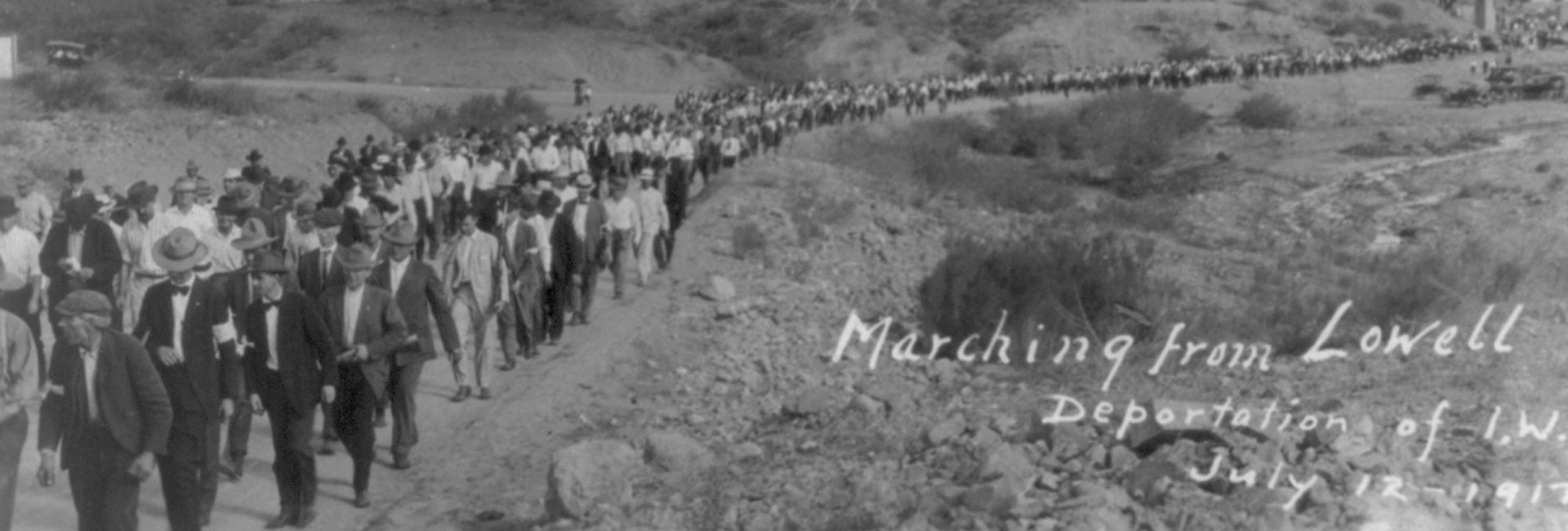Dec. 13, 1920: The Bisbee deportations are upheld

Photo courtesy of Library of Congress.
On the morning of July 12, 1917, Mrs. H.R. McLellan was startled by the sight of hundreds of men marching just below her Bisbee, Arizona, home. From her house on Chihuahua Hill, she could see them filing down Naco Road, escorted by men carrying rifles. Her husband immediately surmised what was happening: a roundup of the mining town’s striking smelter workers.
Dashing toward downtown, she discovered only armed men patrolling otherwise deserted streets. When she returned home, her two children were alone, still asleep, and her husband was gone. “I suppose they got my husband while I was downtown two hours,” she wrote later that day.
The roundup, which came to include 1,186 detainees, was part of a general deportation action organized by Cochise County Sheriff Harry Wheeler. Later known as the Bisbee Deportation, the operation involved about 2,000 citizens from Bisbee and nearby Douglas, mostly anti-labor members of the local Citizen’s Protective League. Citing vague threats of anarchist violence, Wheeler had deputized them to gather and transport the men by company-owned rail across state lines, where the plan was for them to be detained by the Army at Camp Furlong.
The train arrived by late afternoon at Camp Furlong, where Army officials refused to accommodate the detainees because they had no orders from Washington to do so, and there were insufficient sanitary and lodging facilities.
The extraordinary expulsion was the culmination of a three-week labor dispute at Bisbee’s Phelps Dodge copper smelter involving the International Union of Mine, Mill and Smelter Workers. But the dispute over working rules and conditions had escalated with the arrival of “Wobblies”—members of the more militant Industrial Workers of the World. Their radical reputation and opposition to the ongoing war in Europe were not warmly embraced in Bisbee, even by the union.
But once Wheeler’s operation began, it swept up not only Wobblies and foreign-born strikers, but also labor sympathizers—even longtime Bisbee residents who refused to cross picket lines or simply hadn’t showed up for work. Local telephone and telegraph lines were shut down. A few shots were exchanged, killing two. And as the detainees were loaded onto 23 box and cattle cars owned by Phelps Dodge, they were instructed never to return to Bisbee—or Arizona—under threat of death or great bodily harm.
The deportation itself proved chaotic. The cars were crowded, hot and filthy. Water was scarce and food even scarcer. And when Camp Furlong refused to accept the detainees, the train backtracked to a rail station in Hermanas, New Mexico, where food and water were finally provided. Days later, soldiers from Camp Furlong brought them to Columbus, New Mexico, where for the next two months, they wandered freely or simply left.
Back in Bisbee, the deportations continued through August, authorized by “courts” created by Wheeler. They were halted when a presidential commission was announced to probe the sources of wartime labor unrest. As its first order of work, the commission investigated the Bisbee Deportation, helping to mediate a return to work by some of the deported strikers. But its November 1917 report, written by commission counsel Felix Frankfurter, concluded that fears of striker violence were unwarranted and that the Bisbee Deportation had been “wholly illegal and without authority in law, either state or federal.”
In May 1918, a federal grand jury indicted Wheeler and two dozen others, including the top management of Phelps Dodge and Calumet & Arizona Mining, for conspiring to intimidate and oppress the strikers. But at a pretrial hearing, the charges were quashed by the trial judge, who concluded that the federal government had no authority to bring the case.
On Dec. 13, 1920, the U.S. Supreme Court agreed. In an 8-1 opinion written by Chief Justice Edward Douglass White, the court argued—as it had during the decline of Reconstruction—that only the states had constitutional authority to punish individual citizens for violating the constitutional “privileges and immunities” of others; the federal government could only enforce violations by the states themselves. That Wheeler and his deputies had presumed to act under state authority did not matter; seizing and deporting citizens from one state to another broke no existing federal law.
This story was originally published in the December 2021/January 2022 issue of the ABA Journal under the headline: “The Bisbee Deportations Upheld.”
Write a letter to the editor, share a story tip or update, or report an error.


